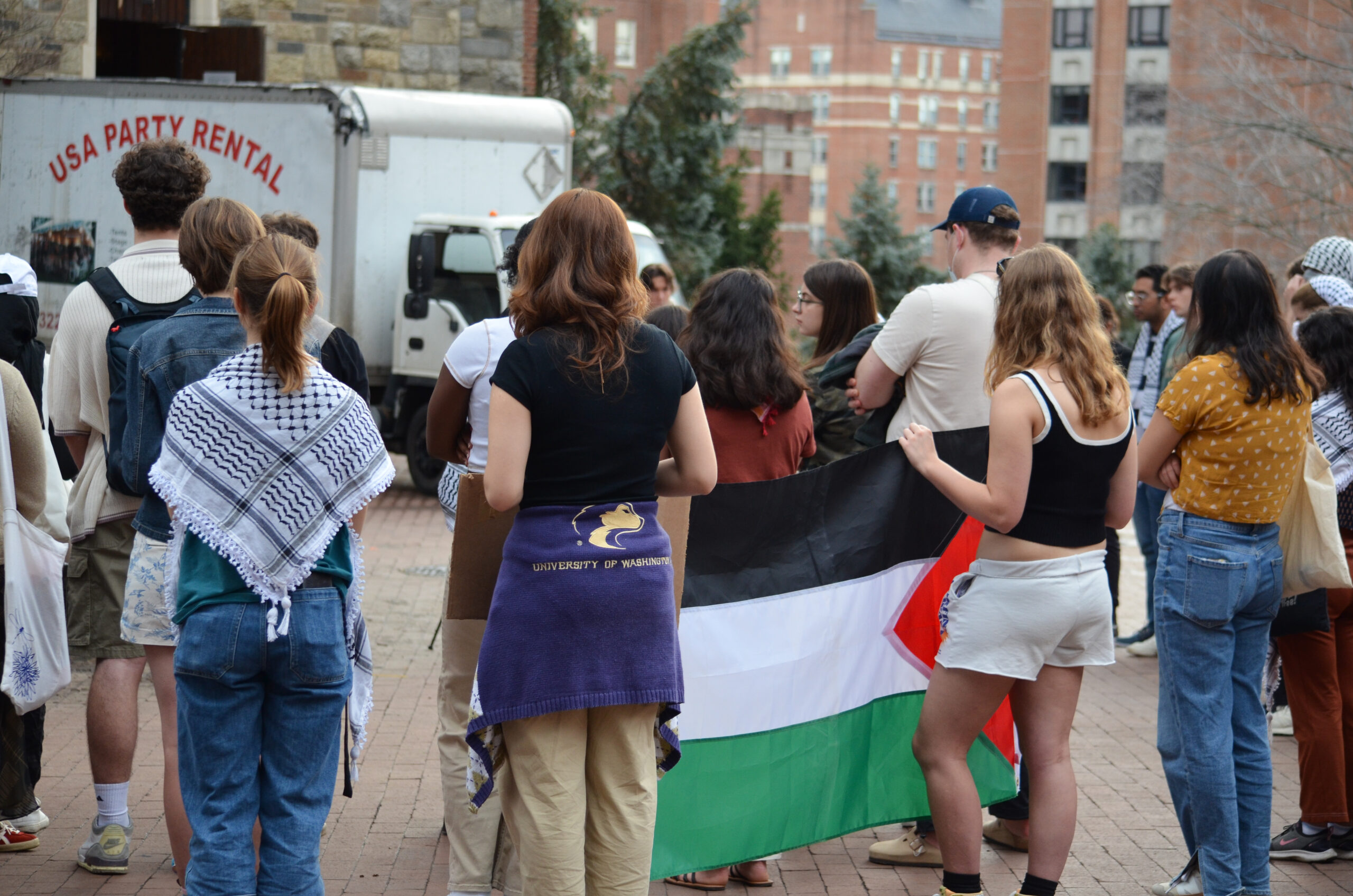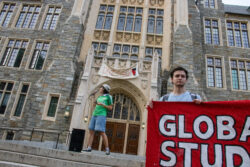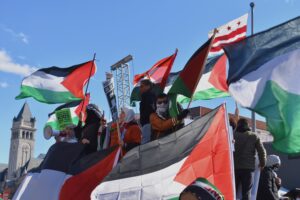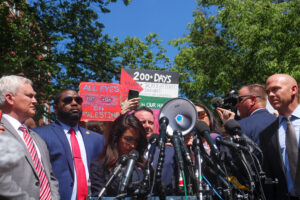Students from across the university joined together on Jan. 26 for a ‘Day of Solidarity’ with Gaza and the West Bank. The day included two vigils, one held at noon by GU Medical Students for Palestine (GUMEDS4PAL), and another held at 3:30 p.m. by Georgetown University Students for Justice in Palestine (SJP). Speakers at both vigils honored those killed by Israel’s ongoing genocide in Gaza and echoed calls for an immediate ceasefire.
Georgetown’s Day of Solidarity was inspired by Palestinian journalist Bisan Owda’s calls for a ‘global strike’ for Gaza during the week of Jan. 21 to 28.
Heeding the call, Zeytoun, a group of Georgetown students, staff, and faculty that advocate for decolonization in Southwest Asia and North Africa, asked students to “divest with your time, attention, and money on Georgetown’s campus.” Beyond the two vigils, organizers also asked students to boycott Starbucks (both that day and in perpetuity) for its censorship of pro-Palestine social media content posted by Starbucks Workers United, the company’s union.
At the noon vigil, held by GUMEDS4PAL on Georgetown’s medical school campus, students read the names and biographies of roughly one dozen medical workers killed in Gaza by Israeli attacks. For the organizers, humanizing victims was essential to the spirit of the vigil.
“We had people read aloud one health care worker who we hopefully will remember forever, and that was a lot deeper of a connection for everyone that attended,” Yusra Rafeeqi, a first-year medical student and organizer with GUMEDS4PAL, said in an interview with the Voice. “We got to know these people more intimately and we got to also gain that connection to them.”
Students in GUMEDS4PAL have faced widespread backlash from conservative media. Despite threats, doxxing, and negative media coverage, the group’s organizers feel that their mission is more important now than ever.
“I think the motivation for this vigil is that it is our duty—as future physicians and as humans. Georgetown School of Medicine teaches us about cura personalis (caring for the whole person), but how can we actually care for ‘the whole person’ if we refuse to acknowledge and challenge the historical context that creates the systems that oppress our patients?” Michael, a Georgetown medical student and organizer, said. “We’re witnessing medical terrorism in the midst of the genocide, where kids can’t get insulin pens, where there are no ICUs and daily unfathomable psychiatric trauma that will permeate generations.”
Later in the day, SJP held a vigil in Red Square on the main campus. During the vigil, representatives from several student groups spoke and SJP’s organizers read the names of college-aged people killed in Gaza.
“They are the literal friends and families of many of the people who are gathered here today,” Lukas Soloman (SFS ‘26), a speaker at the vigil, said. “We speak to their names. We read their names to honor their life and to continue their life.”
Reading the names of people aged 17-22 killed in Gaza by Israel took approximately one hour, 30 minutes, and 30 seconds. Despite how many names were read, the list was still far from complete. In fact, it included only around one-quarter of the names of college-aged people killed by Israeli attacks.
“It’s important to note that we do not have a complete list of every college-age student who has been murdered, because it’s just impossible to get every single name. The list that we do have was estimated to be about 23% of the total,” Soloman said.
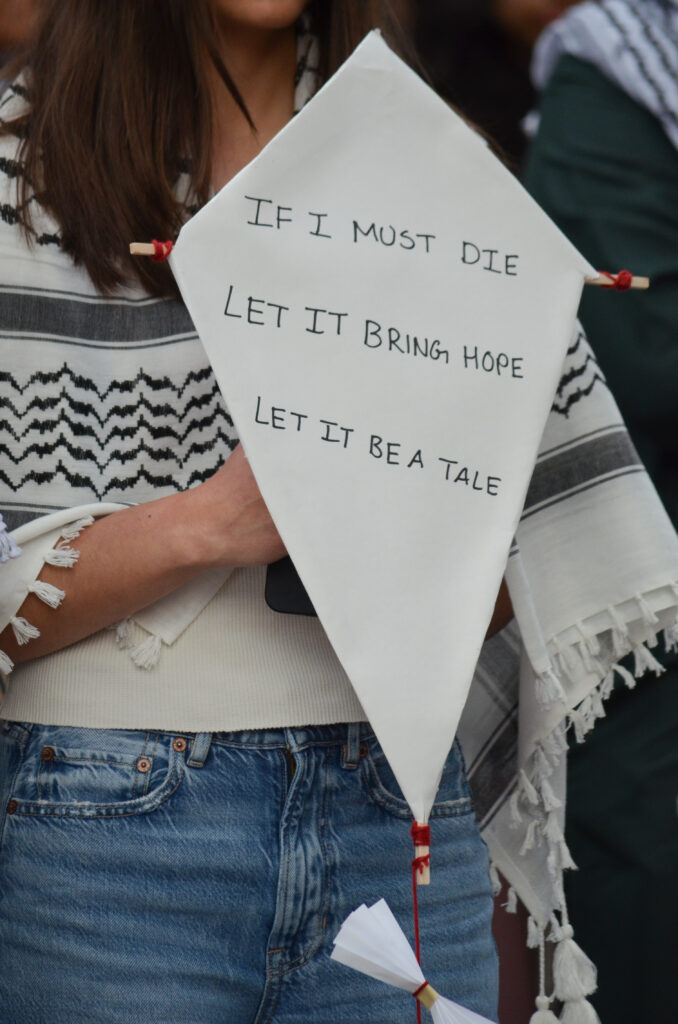 Photo by Sabrina Shaffer
Photo by Sabrina Shaffer
Representatives from the Muslim Students Association (MSA), including Iman Brin (SFS ‘26), led a prayer for all those affected by Israel’s genocide in Gaza.
“O Allah, be there for our brothers and sisters in Gaza and in all of Palestine/O Allah, ease their worry/And relieve their distress/And heal their wounded/And cure those who are sick.”
Representatives from Jewish Voice for Peace (JVP), including Lela Tolajian (SFS ‘26) and Miriam Siegel (CAS ‘26), also led a traditional prayer. Their prayer followed the Jewish tradition of confessing sins in the plural.
“We confess our sins in the plural knowing that even if we personally have not committed every sin, G-d forbid, our souls are bound up with one another,” Siegel explained.
Tolajian and Siegel then read sins committed by Israel and the global community against the Palestinian people, encouraging the crowd to respond ‘ashamnu,’ a Hebrew word meaning ‘we are guilty.’
“For the children living in fear from bombs, ashamnu/ for the children killed by bombs, ashamnu/ for the children made orphans by bombs, ashamnu/for the grieving parents, ashamnu.”
After the planned speeches ended, organizers encouraged community members to come forward and speak. A student involved in Dharmic life on campus reflected on how the principles of Dharmic faith keep them motivated to work toward an end to the suffering in Gaza and the West Bank.
“If there’s one thing that the Dharmas teach us, it’s that our lives, our communities and our universe are composed of cycles. The Palestinian people have been facing cycles of oppression, genocide and violence on an unprecedented scale. The Dharmas teach us that we must release ourselves from the cycles of suffering and in releasing ourselves we need to advocate and fight for the release of others.”
Afterward, Sister Iman Saymeh, a Palestinian American Residential Minister in Nevils and LXR, spoke about how campus activism has changed since earlier in the academic year.
“It takes a lot of courage to be here. We gathered in the same place back in October. It’s so sad that we’re still here. It’s so sad that you’re still talking about the same rights that we want for these people,” Sister Iman said. “In October, most of you covered your faces. Enough is enough. We get to the point where we say we are people of justice. We are people of humanity.”
Sister Iman also connected the day’s vigil to the International Court of Justice’s (ICJ) ruling earlier that morning, which determined that it was “plausible” that Israel had committed acts of genocide in Gaza. This ruling came as a disappointment to Palestinians and allies alike, as the ICJ did not call for an immediate ceasefire.
“This particular ritual was rescheduled twice. But there is no mistake in Allah’s timing, God’s timing,” Sister Iman said. “It came after today’s verdict, to give us what we need to keep going as we start the semester. Lean on each other, create this community, continue advocating.”
As Israel’s genocide in Gaza continues, the event’s speakers stressed that campus advocacy remains key in signaling to school administrators and global leaders that the world does not stand by the atrocities being committed against the Palestinian people. The work of campus organizations is ongoing, as suggested by Sister Iman, and their work is essential to ensuring peace for the people of Gaza.
“As I always say, these gatherings cannot happen without the advocacy of the students. These are not staff or professor or VP or President led,” Sister Iman said. “You guys are creating this movement on your campus. Leave a legacy for people to be completely seen and heard.”
Georgetown’s ‘Day of Action’ called for not only an immediate and permanent ceasefire but also brought to life the stories and real lives of the thousands murdered in Gaza. Organizers hope that actions like these will continue across Georgetown’s many communities, creating safe spaces, and showing a student body united with those in Palestine.
“I really wanted to see a community that fosters an environment of safety for Palestinians and people who are allies of Palestinians because it’s not usually a safe space for those people in general and [in] higher up institutions,” Rafeeqi said. “I wanted to see Georgetown at least have a community that could allow students to identify with being Palestinian and not have to kind of feel afraid to say they are pro-Palestine.”
Editor’s Note: Lukas Solomon is an editor for the Voice.

